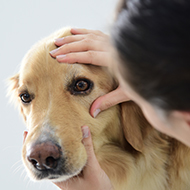Changes to CHS 2020 Eye Scheme announced

The changes will be effective from 1 January 2020.
The Kennel Club and the BVA has announced changes to the Canine Health Schemes (CHS) Eye Scheme for 2020.
The move follows consultation with the Eye Panel Working Party, and will see the removal of Schedule B. Instead, the CHS ‘Sightings report’, which records and monitors evidence of conditions and abnormalities, will be used to add and remove breeds to and from Schedule A.
In a press release, the Kennel Club said: ‘Where evidence of new and emerging conditions has been noted via the sightings reports, breeds may be considered for addition to Schedule A, and where no reports of affected dogs have been noted for a period of five years, breeds may be considered for removal from Schedule A.
‘Due to evidence of an established condition, the following breeds currently listed on Schedule B will be added to Schedule A: Border Collie (Goniodysgenesis/primary glaucoma), French Bulldog (Hereditary cataracts early onset), Hungarian Vizsla (Generalised progressive retinal atrophy), Papillon (Generalised progressive retinal atrophy), and Golden Retriever (Goniodysgenesis/primary glaucoma).
‘Remaining breeds currently listed on Schedule B have had very few reports of associated eye conditions and so will no longer be listed, as evidence suggests that the breed is not, at this time, predisposed to the condition.’
The changes, which also include wording on the eye certificates, will be effective from 1 January 2020.
Bill Lambert, Senior Health and Welfare Manager at the Kennel Club commented: “Collaboratively with the BVA and the Eye Panel Working Party, we have agreed that Schedule B is removed as it no longer serves a reasonable purpose. We now have improved ways to more effectively monitor eye conditions in all breeds with an annual sightings report, which has run alongside the scheme for five years now.
“Many breeders will welcome the opportunity to participate in the scheme and have the results published on the Kennel Club Health Tests Results Finder regardless of whether their breed appears on Schedule A. Any abnormalities collated in this sightings report will be reviewed annually by the Eye Panel Working Party, providing continual surveillance of the incidence of any new and emerging conditions in any breed, and assisting breeders in making sensible breeding decisions that promote good dog health.”
BVA president, Daniella Dos Santos added: “The annual sightings report means we now have five years of data on which dogs are most affected by hereditary eye diseases. We hope the removal of Schedule B will make it easier for breeders to recognise and test the breeds that are most likely to be affected by these diseases and we’ll continue to encourage routine eye screening for dogs of any breed, both purebred and crossbreed, both to ensure we have the most accurate data possible and to safeguard the health of the dogs involved.”
For more information about the updates, visit https://www.thekennelclub.org.uk/eye-scheme-questions



 The Veterinary Medicines Directorate (VMD) is inviting applications from veterinary students to attend a one-week extramural studies (EMS) placement in July 2026.
The Veterinary Medicines Directorate (VMD) is inviting applications from veterinary students to attend a one-week extramural studies (EMS) placement in July 2026.